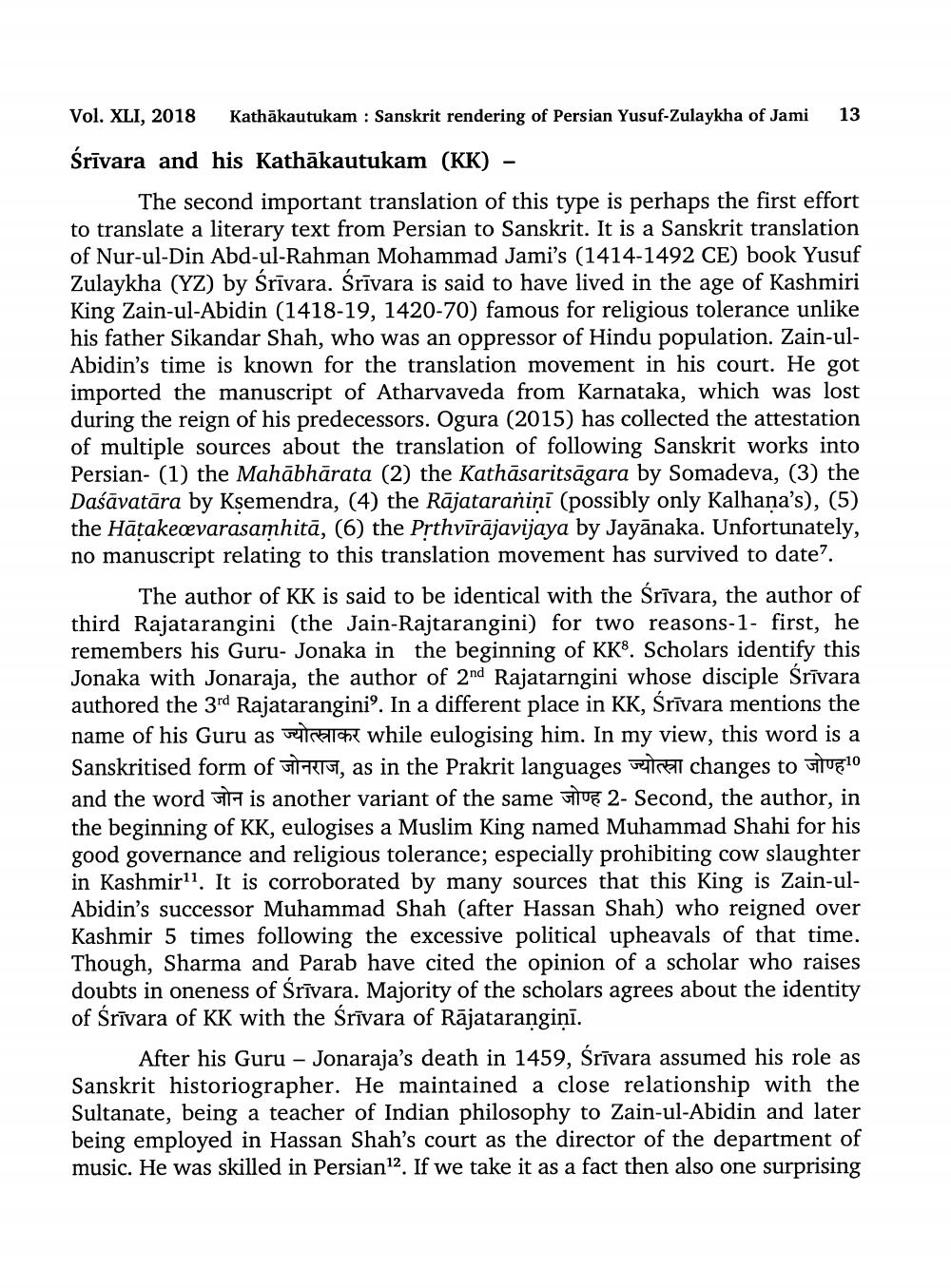________________
Vol. XLI, 2018
Kathākautukam : Sanskrit rendering of Persian Yusuf-Zulaykha of Jami
13
Ti
Śrīvara and his Kathākautukam (KK) –
The second important translation of this type is perhaps the first effort to translate a literary text from Persian to Sanskrit. It is a Sanskrit translation of Nur-ul-Din Abd-ul-Rahman Mohammad Jami's (1414-1492 CE) book Yusuf Zulaykha (YZ) by Śrīvara. Śrīvara is said to have lived in the age of Kashmiri King Zain-ul-Abidin (1418-19, 1420-70) famous for religious tolerance unlike his father Sikandar Shah, who was an oppressor of Hindu population. Zain-ulAbidin's time is known for the translation movement in his court. He got imported the manuscript of Atharvaveda from Karnataka, which was lost during the reign of his predecessors. Ogura (2015) has collected the attestation of multiple sources about the translation of following Sanskrit works into Persian- (1) the Mahābhārata (2) the Kathāsaritsāgara by Somadeva, (3) the Daśāvatāra by Ksemendra, (4) the Rājatarañiņi (possibly only Kalhana's), (5) the Hāțakeæevarasamhitā, (6) the Prthvīrājavijaya by Jayānaka. Unfortunately, no manuscript relating to this translation movement has survived to date?
The author of KK is said to be identical with the Śrīvara, the author of third Rajatarangini (the Jain-Rajtarangini) for two reasons-1- first, he remembers his Guru- Jonaka in the beginning of KK8. Scholars identify this Jonaka with Jonaraja, the author of 2nd Rajatarngini whose disciple Śrīvara authored the 3rd Rajataranginio. In a different place in KK, Srīvara mentions the name of his Guru as wellcach while eulogising him. In my view, this word is a Sanskritised form of जोनराज, as in the Prakrit languages ज्योत्स्रा changes to जोण्ह10 and the word GT is another variant of the same flu 2- Second, the author, in the beginning of KK, eulogises a Muslim King named Muhammad Shahi for his good governance and religious tolerance; especially prohibiting cow slaughter in Kashmir11. It is corroborated by many sources that this King is Zain-ulAbidin's successor Muhammad Shah (after Hassan Shah) who reigned over Kashmir 5 times following the excessive political upheavals of that time. Though, Sharma and Parab have cited the opinion of a scholar who raises doubts in oneness of Śrīvara. Majority of the scholars agrees about the identity of Śrīvara of KK with the Śrīvara of Rājataranginī.
After his Guru - Jonaraja's death in 1459, Śrīvara assumed his role as Sanskrit historiographer. He maintained a close relationship with the Sultanate, being a teacher of Indian philosophy to Zain-ul-Abidin and later being employed in Hassan Shah's court as the director of the department of music. He was skilled in Persian12. If we take it as a fact then also one surprising




